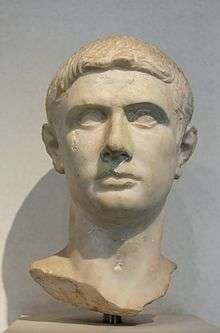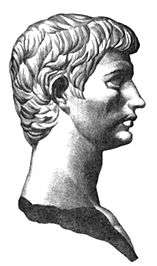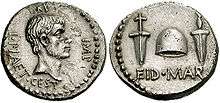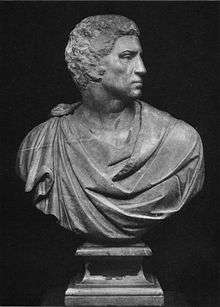Marcus Junius Brutus the Younger
| Marcus Junius Brutus the Younger | |
|---|---|
 Marble bust of Brutus, at the Palazzo Massimo alle Terme in the National Museum of Rome | |
| Senator of the Roman Republic | |
|
In office 58 BC – 42 BC | |
| Personal details | |
| Born |
June 85 BC Rome, Roman Republic |
| Died |
23 October 42 BC (aged 43) Philippi, Macedonia |
| Nationality | Roman |
| Occupation | Politician, jurist, military commander |
| Known for | Assassination of Julius Caesar |
| Religion | Roman Paganism, (Cultus Deorum Romanorum) |
Marcus Junius Brutus (/ˈbruːtəs/; early June 85 BC – 23 October 42 BC), often referred to as Brutus, was a politician of the late Roman Republic. After being adopted by his uncle he used the name Quintus Servilius Caepio Brutus, but eventually returned to using his original name.[1]
He is best known in modern times for taking a leading role in the assassination of Julius Caesar.[1]
Early life
_-_n._16585_-_Roma_-_Museo_Capitolino_-_Marco_Giunio_Bruto%2C_busto_in_marmo..jpg)
Marcus Junius Brutus Minor (Classical Latin: [ˈmaːr.kʊs ˈjuː.ni.ʊs ˈbruː.tʊs ˈmɪ.nɔr]) was the son of Marcus Junius Brutus Maior and Servilia Caepionis. His father was killed by Pompey the Great in dubious circumstances after he had taken part in the rebellion of Lepidus; his mother was the half-sister of Cato the Younger, and later Julius Caesar's mistress.[2] Some sources refer to the possibility of Caesar being his real father,[3] despite Caesar's being only 15 years old when Brutus was born.
Brutus' uncle, Quintus Servilius Caepio, adopted him in about 59 BC, and Brutus was known officially for a time as Quintus Servilius Caepio Brutus before he reverted to using his birth-name. Following Caesar's assassination in 44 BC, Brutus revived his adoptive name in order to illustrate his links to another famous tyrannicide, Gaius Servilius Ahala, from whom he was descended.[4][5]
Brutus held his uncle in high regard[6] and his political career started when he became an assistant to Cato, during his governorship of Cyprus.[7] During this time, he enriched himself by lending money at high rates of interest. Brutus was also active in the province of Cilicia, in the year before Cicero was proconsul there; Cicero documents how Brutus profited from money lending to the provincials in his Letters.[8] He returned to Rome a rich man, where he married Claudia Pulchra.[9] From his first appearance in the Senate, Brutus aligned with the Optimates (the conservative faction) against the First Triumvirate of Marcus Licinius Crassus, Gnaeus Pompeius Magnus and Gaius Julius Caesar.
Senate career
When civil war broke out in 49 BC between Pompey and Caesar, Brutus followed his old enemy and present leader of the Optimates, Pompey. When the Battle of Pharsalus began, Caesar ordered his officers to take Brutus prisoner if he gave himself up voluntarily, but to leave him alone and do him no harm if he persisted in fighting against capture.[10]
After the disaster of the Battle of Pharsalus, Brutus wrote to Caesar with apologies and Caesar immediately forgave him. Caesar then accepted him into his inner circle and made him governor of Gaul when he left for Africa in pursuit of Cato and Metellus Scipio. In 45 BC, Caesar nominated Brutus to serve as urban praetor for the following year.
Also, in June 45 BC, Brutus divorced his wife and married his first cousin, Porcia Catonis, Cato's daughter.[11][12] According to Cicero the marriage caused a semi-scandal as Brutus failed to state a valid reason for his divorce from Claudia other than he wished to marry Porcia.[13] The marriage also caused a rift between Brutus and his mother, who resented the affection Brutus had for Porcia.[14]
Assassination of Julius Caesar (March 15 44 BC)

Around this time, many senators began to fear Caesar's growing power following his appointment as dictator in perpetuity.[15] Brutus was persuaded into joining the conspiracy against Caesar by the other senators.[16] Eventually, Brutus decided to move against Caesar after Caesar's king-like behavior prompted him to take action.[17][18] His wife was the only woman privy to the plot.[19][20]
The conspirators planned to carry out their plot on the Ides of March (March 15) that same year. On that day, Caesar was delayed going to the Senate because his wife, Calpurnia Pisonis, tried to convince him not to go.[21] The conspirators feared the plot had been found out.[22] Brutus persisted, however, waiting for Caesar at the Senate, and allegedly still chose to remain even when a messenger brought him news that would otherwise have caused him to leave.[23]
When Caesar finally did come to the Senate, they attacked him. Publius Servilius Casca Longus was allegedly the first to attack Caesar with a blow to the shoulder, which Caesar blocked.[24] However, upon seeing Brutus was with the conspirators, he covered his face with his toga and resigned himself to his fate.[25] The conspirators attacked in such numbers that they even wounded one another. Brutus is said to have been wounded in the hand and in the legs.[26][27]
After the assassination, the Senate passed an amnesty on the assassins. This amnesty was proposed by Caesar's friend and co-consul Mark Antony (Marcus Antonius). Nonetheless, uproar among the population caused Brutus and the conspirators to leave Rome. Brutus settled in Crete from 44 to 42 BC.

In 43 BC, after Octavian received his consulship from the Roman Senate, one of his first actions was to have the people who had assassinated Julius Caesar declared murderers and enemies of the state.[28] Marcus Tullius Cicero, angry at Octavian, wrote a letter to Brutus explaining that the forces of Octavian and Mark Antony were divided. Antony had laid siege to the province of Gaul, where he wanted a governorship. In response to this siege, Octavian rallied his troops and fought a series of battles in which Antony was defeated.[29]
Battle of Philippi (42 BC)
Upon hearing that neither Mark Antony nor Octavian had an army large enough to defend Rome, Brutus rallied his troops, which totalled about 17 legions. When Octavian heard that Brutus was on his way to Rome, he made peace with Antony.[30] Their armies, which together totalled about 19 legions, marched to meet Brutus and Gaius Cassius Longinus. The two sides met in two engagements known as the Battle of Philippi. The first was fought on October 3, 42 BC, in which Brutus defeated Octavian's forces, although Cassius was defeated by Antony's forces. The second engagement was fought on October 23, 42 BC and ended in Brutus' defeat.

After the defeat, he fled into the nearby hills with only about four legions. Knowing his army had been defeated and that he would be captured, Brutus committed suicide by running into his own sword being held by two of his own men. Among his last words were, according to Plutarch, "By all means must we fly; not with our feet, however, but with our hands." Brutus also uttered the well-known verse calling down a curse upon Antony (Plutarch repeats this from the memoirs of Publius Volumnius): Forget not, Zeus, the author of these crimes (in the Dryden translation this passage is given as Punish, great Jove, the author of these ills).[31] Plutarch wrote that, according to Volumnius, Brutus repeated two verses, but Volumnius was only able to recall the one quoted.
Mark Antony, as a show of great respect, ordered Brutus' body to be wrapped in Antony's most expensive purple mantle (this was later stolen and Antony had the thief executed). Brutus was cremated, and his ashes were sent to his mother, Servilia Caepionis.[32] His wife Porcia was reported to have committed suicide upon hearing of her husband's death, although, according to Plutarch (Brutus 53 para 2), there is some dispute as to whether this is the case: Plutarch states that there is a letter in existence that was allegedly written by Brutus mourning the manner of her death.[33][33][34][35]
Chronology
- 85 BC: Brutus was born in Rome to Marcus Junius Brutus The Elder and Servilia Caepionis.
- 58 BC: He was made assistant to Cato, governor of Cyprus which helped him start his political career.
- 53 BC: He was given the quaestorship in Cilicia.
- 49 BC: Brutus followed Pompey to Greece during the civil war against Caesar.
- 48 BC: Brutus was pardoned by Caesar.
- 46 BC: He was made governor of Gaul.
- 45 BC: He was made Praetor.
- 44 BC: Murdered Caesar with other liberatores; went to Athens and then to Crete.
- 42 BC: Battle with Mark Antony's forces.
Legacy
This was the noblest Roman of them all:
All the conspirators save only he
Did that they did in envy of great Caesar;
He only, in a general honest thought
And common good to all, made one of them.
His life was gentle, and the elements
So mix'd in him that Nature might stand up
And say to all the world "This was a man!"
Influence

- The phrase Sic semper tyrannis! ["thus, ever (or always), to tyrants!"] is attributed to Brutus at Caesar's assassination. The phrase is also the official motto of the Commonwealth of Virginia.
- John Wilkes Booth, the assassin of Abraham Lincoln, claimed to be inspired by Brutus. Booth's father, Junius Brutus Booth, was named for Brutus, and Booth (as Mark Antony) and his brother (as Brutus) had performed in a production of Julius Caesar in New York just six months before the assassination. On the night of the assassination, Booth is alleged to have shouted "Sic semper tyrannis" while leaping to the stage of Ford's Theater. Lamenting the negative reaction to his deed, Booth wrote in his journal on April 21, 1865, while on the run, "[W]ith every man's hand against me, I am here in despair. And why; For doing what Brutus was honored for ... And yet I for striking down a greater tyrant than they ever knew am looked upon as a common cutthroat." Booth was also known to be greatly attracted to Caesar himself, having played both Brutus and Caesar upon various stages. [36]
- The well-known phrase "Et tu, Brute?" ("And you, Brutus?") is famous as Caesar's utterance in the play Julius Caesar, although they are not his last words, and the sources describing Caesar's death disagree about what his last words were.
Fiction
- In Dante's Inferno, Brutus is one of three people deemed sinful enough to be chewed in one of the three mouths of Satan, in the very center of Hell, for all eternity. The other two are Cassius, who was Brutus's fellow conspirator, and Judas Iscariot (Canto XXXIV). Dante condemned these three in the afterlife for being Treacherous Against Their Masters and enemies of the King/Emperor.
- Shakespeare's play Julius Caesar depicts Caesar's assassination by Brutus and his accomplices, and the murderers' subsequent downfall. In the final scene, Mark Antony describes Brutus as "the noblest Roman of them all", for he was the only conspirator who acted for the good of Rome.
- In the Masters of Rome novels of Colleen McCullough, Brutus is portrayed as a timid intellectual whose relationship with Caesar is deeply complex. He resents Caesar for breaking his marriage arrangement with Caesar's daughter, Julia, whom Brutus deeply loved, so that she could be married instead to Pompey the Great. However, Brutus enjoys Caesar's favor after he receives a pardon for fighting with Republican forces against Caesar at the Battle of Pharsalus. In the lead-up to the Ides of March, Cassius and Trebonius use him as a figurehead because of his family connections to the founder of the Republic. He appears in Fortune's Favourites, Caesar's Women, Caesar and The October Horse.
- The Ides of March is an epistolary novel by Thornton Wilder dealing with characters and events leading to, and culminating in, the assassination of Julius Caesar.
- In the TV series Rome, Brutus, portrayed by Tobias Menzies, is depicted as a young man torn between what he believes is right, and his loyalty and love of a man who has been like a father to him. In the series, his personality and motives are somewhat inaccurate, as Brutus is portrayed as an unwilling participant in politics. In the earlier episodes he is frequently inebriated and easily ruled by emotion. Brutus' relationship to Cato is not mentioned, and his three sisters and wife Porcia are omitted from the series completely.
- Brutus is an occasional supporting character in Asterix comics, most notably Asterix and Son in which he is the main antagonist. The character appears in the first three live Asterix film adaptations - though briefly in the first two - Asterix and Obelix vs Caesar (played by Didier Cauchy) and Asterix at the Olympic Games. In the latter film, he is portrayed as a comical villain by Belgian actor Benoît Poelvoorde: he is a central character to the film, even though he was not depicted in the original Asterix at the Olympic Games comic book. Following sources cited in Plutarch, he is implied in that film to be Julius Caesar's biological son.
- The Hives' song "B is for Brutus" contains titular and lyrical references to Junius Brutus.
- The video game Assassin's Creed: Brotherhood features a small side story in the form of the "Scrolls of Romulus" written by Brutus, which reveals that Caesar was a Templar and Brutus and the conspirators were members of the Roman Brotherhood of Assassins. At the end of the side quest, the player is able to get Brutus' armor and dagger.
- The cartoon character primarily known as "Bluto" was renamed "Brutus" for a few years.
- The 1911 Italian silent film Brutus portrays the life of Brutus.
See also
References
- 1 2 Europius, translated, with notes, by Rev. John Selby Watson (1843). "Abridgement of Roman History". Forumromanum.org. Retrieved 2011-01-16.
- ↑ Suetonius, The Deified Julius, 50
- ↑ Plutarch, Life of Brutus, 5.2.
- ↑ M. Crawford (1971) Roman Republican Coinage 502.2 shows that Brutus issued coins bearing the inscription Q. CAEPIO BRVTVS PRO [COS] (Q. Caepio Brutus, proconsul) in 42 BC
- ↑ "Coin bearing inscription Q. Caepio Brutus". oldcoin.com.au. Retrieved 2011-01-16.
- ↑ Plutarch, Life of Brutus, 2.1.
- ↑ Plutarch, Life of Brutus, 3.1.
- ↑ Cicero, Att. V 21
- ↑ Cicero. ad Fam. iii. 4.
- ↑ Plutarch, Life of Brutus, 5.1.
- ↑ Plutarch, Marcus Brutus, 13.3.
- ↑ Cicero. Brutus. 77, 94
- ↑ Cic. Att. 13. 16
- ↑ Cic. Att. 13. 22
- ↑ Cassius Dio, Roman History, 44.8.4.
- ↑ Cassius Dio, Roman History, 44.12.2.
- ↑ Cassius Dio, Roman History, 44.12.3.
- ↑ Cassius Dio, 44.13.1.
- ↑ Cassius Dio, 44.13.
- ↑ Plutarch, Marcus Brutus, 14.4
- ↑ Plutarch. Marcus Brutus. 15.1.
- ↑ Cassius Dio. Roman History. 44.18.1.
- ↑ Plutarch. Marcus Brutus. 15.5.
- ↑ Plutarch. Marcus Brutus. 17.5.
- ↑ Plutarch. Marcus Brutus. 17.6.
- ↑ Plutarch. Marcus Brutus. 17.7.
- ↑ Nicolaus. Life of Augustus. 24.
- ↑ Plutarch, translated by John Dryden. "Marcus Brutus". Greek Texts. p. 13. Retrieved 2011-01-16.
- ↑ "Marcus Vipsanius Agrippa". Livius.org. 2010-01-02. Retrieved 2011-01-16.
- ↑ "Ancient Greek Online library: Marcus Brutus by Plutarch page 13". Greektexts.com. 2005. Retrieved 2011-01-16.
- ↑ Plutarch, Life of Brutus, chapter 48
- ↑ Plutarch, Marcus Brutus, 52.1-53.4.
- 1 2 Valerius Maximus, De factis mem. iv.6.5.
- ↑ Cassius Dio, Roman History. 47.49.3.
- ↑ Appian, The Civil Wars, Book 5.136.
- ↑ "John Wilkes Booth Manuscript". Baltimore Sun. 26 April 1992. Retrieved 24 December 2013.
Further reading
- Clarke, M. L. (1981). The Noblest Roman. Ithaca, NY: Cornell University Press.
- Heitland, W. E. (1909). The Roman Republic. Cambridge: Cambridge University Press.
- Plutarch (1910). Arthur H. Clough, eds. Lives. London: Dutton.
- Syme, Ronald (1939). The Roman Revolution. Oxford: Oxford University Press.
- Wistrand, Erik (1981). The Policy of Brutus the Tyrannicide. Goteborg, Sweden: Kungl.
- Parenti, Michael (2003). The Assassination of Julius Caesar. New York: New Press.
- Corrigan, Kirsty (2015). Brutus - Caesar's Assassin. Barnsley: Pen & Sword Military.
External links
-
 Quotations related to Marcus Junius Brutus at Wikiquote
Quotations related to Marcus Junius Brutus at Wikiquote -
 Media related to Marcus Junius Brutus at Wikimedia Commons
Media related to Marcus Junius Brutus at Wikimedia Commons - Information on Marcus Junius Brutus from www.Greektext.com
- Livius.org: Brutus
| ||||||||||||||||||
|